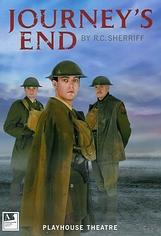Journey's End
R C Sheriff's First World War play celebrates its 75th anniversary this year and in David Grindley's impressive new production it remains as powerful and poignant as ever. Some of the language may be archaic but the situations it depicts and the emotions conveyed are timeless as is the constant tightrope between humour and horror as the men seek sanity in the midst of chaos.
Set in the claustrophobic confines of a dug-out in St Quentin on the eve of the war's last great offensive, the action revolves around a group of men led by Captain Stanhope, a young officer on the brink of a breakdown. Only whisky keeps his shattered nerves from complete disintegration. His hopes of anonymity are shattered when fresh-faced Raleigh joins his division, a boy he's known at school whose arrival acts as the catalyst for a dramatic confrontation.
Such a tense drama requires the finest ensemble for maximum impact and happily Grindley's cast are truly excellent. Taking the role that newcomer Laurence Olivier had in 1929, Geoffrey Streatley's Stanhope may over seem over-pitched, his collapsing morale clearly visible rather than intimated, but David Haig's genial Osborne is outstanding, a schoolmaster happiest exploring the Sussex woods of his home but determined to face all things with equanimity. His brief talk with the uninitiated Raleigh just before their ill-fated raid is a masterpiece in miniature: superb writing given flawless delivery.Christian Coulson's Raleigh is also terrific, his initial enthusiasm swiftly replaced by the shock and disbelief that must be the usual response to war's horror.
On Jonathan Fenson's realistic set, sound designer Gregory Clarke conjures a vividly realistic depiction of life in the trenches, something emphasised by the play's closing moments where a rollcall of World War One casualties unfurls behind the stationary cast. A great play given a first-class production.
What other critics had to say.....
NICHOLAS DE JONGH for THE EVENING STANDARD says, "Still comes at you with such galloping power and poignancy." PAUL TAYLOR for THE INDEPENDENT says, "Deeply affecting revival." MICHAEL BILLINGTON for THE GUARDIAN says, "Works powerfully on our emotions." CHARLES SPENCER for THE DAILY TELEGRAPH says, "Magnificent play." BENEDICT NIGHTINGALE for THE TIMES says, "Gripping." ALASTAIR MACAULAY for THE FINANCIAL TIMES says, "It is as compelling, as moving, as anything in London theatre today."
External links to full reviews from popular press
The Independent
The Guardian
Daily Telegraph
The Times
Financial Times
R.C. Sherriff's play about the horror of World War 1 seems set to become part of London's theatre scene for sometime. This production originally opened in Jan 2004 at the Comedy Theatre and has since transferred to the Playhouse theatre and is now on its 3rd superb cast!
The play focuses upon the lives of five company officers in a dug out as they wait for a major German offensive, an offensive they have been expecting for weeks, but which they now believe to be imminent. R.C. Sherriff captures the terrible suspense of waiting, never knowing what will happen and learning to live with the ubiquitous presence of death. Apart from this terrible waiting, there is little action in the first act, but Sherriff users wry humour as we discover the background of the characters and the tensions between them.
The first act does far more then prepare us for the tragedy of the second, it helps us respect the tenacity of the human spirit that refuses to collapse into barbarity even in the most appalling situations. It is this display of comradeship that makes the remainder of the play so tragic.
Captain Stanhope (Brendan Patricks) is the young man in charge of the small company of officers, his nerves shattered by war he finds solace in whiskey. His world is further thrown into chaos when his new officer, 2nd Lieutenant Raleigh (Peter Sandys-Clarke) arrives. Raleigh attended the same school and remembers Stanhope as his school hero and mentor in life. Stanhope's wishes to be remembered by his family and friends at home as a gallant young man but worries that his dishevelled condition will be reported back home by Raleigh.
The play focuses upon the simple humanness and of these men who face intolerable circumstances. Lieutenant Osborne (Malcolm Sinclair) an ex-school teacher, who does what he can to befriend the younger officers for which he has earned from them the affectionate title of 'uncle'; Trotter (Ian Burfield), who users humour to try and lighten the burden and keep people's spirits high; Raleigh, straight from school and who arrives full of enthusiasm only to be repulsed by the sickening reality of life in the trenches; and Hibbert (Rufus Wright) who struggles with cowardice and would rather face being shot for desertion then re-take his position in the trenches.
Even though the language spoken in the play reflects a deference that belongs to a different age, it does not prevent one from relating to each of these characters. It is the simple gestures of love and regret which Sherriff so touchingly captures, such as when Osborne leaves his wedding ring with Stanhope so that it can be sent onto his wife if anything should happen to him on the raid he is to lead into enemy lines.
There is no blatant anti-war message to Sherriff's drama. Rather then attack the wastefulness of war directly, he instead forces us to confront the brutality of its execution and its indifference to life.
Now on its third cast, the acting remains excellent, which is remarkable considering that both Brendan Patricks (Captain Stanhope) and Peter Sandys-Clarke (2nd Lieutenant Raleigh) are both making their professional debut. There is plenty of raw emotion required for both of these characters to succeed and yet these two actors successfully rise to the challenge, as does the entire ensemble.
A powerful, thought provoking drama that should not be missed.
Alan Bird
Originally published on
